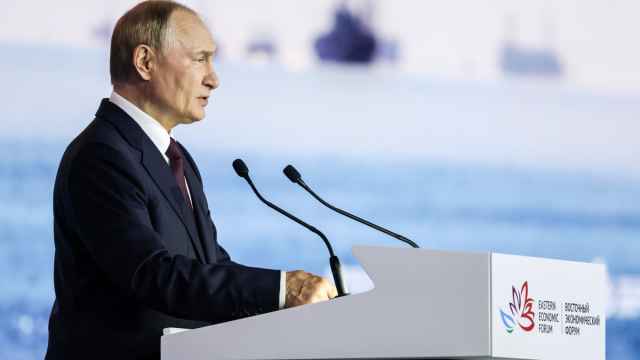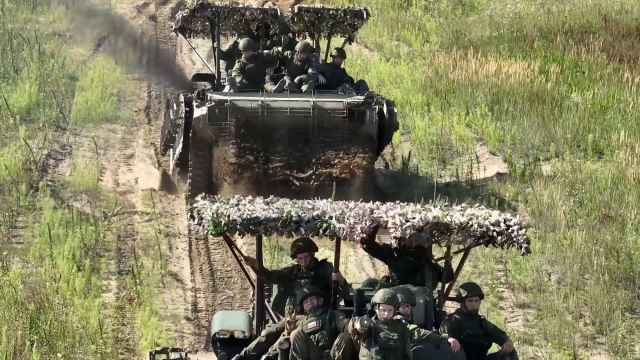The leader of the United Russia party's youth wing is quitting amid criticism that his organization not only failed to shine during this summer's devastating wildfires but found themselves mired in scandal for making a fake video of members fighting blazes.
Ruslan Gattarov, 33, confirmed on Wednesday that he would resign as the leader of Young Guard in October, but he denied that his departure was linked to the group's poor performance during the fires.
But pro-Kremlin activists said the group all but failed to join the firefighting efforts, which attracted thousands of volunteers nationwide earlier this month.
The official reason for Gattarov's departure is a change in policy that will introduce a 28-year age limit for members of Young Guard's political ruling council.
But he is actually being fired over the scandal caused by a photo and video shoot that showed Young Guard members pretending to fight a fire in the Ryazan region earlier this month, Vedomosti reported Wednesday, citing sources within United Russia, the ruling party led by Prime Minister Vladimir Putin.
The incident, which created a hubbub in the blogosphere, has drawn criticism from Vladislav Surkov, the deputy chief of staff of the Kremlin administration who is believed to oversee both United Russia and all pro-Kremlin youth groups, the report said.
The "amateurish" staging of the firefighting effort showed that Young Guard was filled with "dull people" and prompted Surkov to demand new leadership, said Vladimir Pribilovsky, an analyst with Panorama, a think tank.
Gattarov, who became a Federation Council senator in April, denied that he was leaving in connection with the scandal.
“The decision was made in the spring to bring in fresh blood, and it hasn't been changed since,” Gattarov said on his LiveJournal blog.
He insisted that Young Guard had actively combated fires in the Ryazan region and accused journalists of ignoring invitations to watch the group in action.
But not everyone was convinced — even those in fellow pro-Kremlin youth groups.
“I have been to several regions, including the Ryazan region, and not even once did I see any Young Guard members,” Alexander Khodorovsky, a coordinator of the Nashi youth group in the Ryazan region, told The Moscow Times.
Khodorovsky, a Ryazan native, said he spent a week assisting Emergency Situations Ministry firefighters alongside a team of Nashi members and other volunteers not affiliated with any organized groups.
“I wore a Nashi T-shirt, but nobody paid attention because this was not important during a nationwide disaster,” he said.
Khodorovsky said the efforts of pro-Kremlin groups could have won them more support if they had been given more publicity.
The failure to capitalize on the wildfires has shown that both Nashi and Young Guard lack skilled public-relations strategists, while their current PR teams are working “within the existing system of corruption,” said Alexei Mukhin, an analyst with the Center for Political Information.
He said, though, that Nashi could not have expected to boost its reputation through firefighting because of its “damaged credibility.”
“They have such a bad reputation that even their good efforts are viewed with suspicion,” Mukhin said.
He said Nashi is better remembered for stunts like an exhibit at last month's Lake Seliger youth camp that featured portraits of former U.S. Secretary of State Condoleezza Rice, human rights leader Lyudmila Alexeyeva and opposition leader Boris Nemtsov mounted on stakes and wearing hats with swastikas.
Pro-Kremlin groups are capable of harassing opposition leaders but do not live up to the Soviet-era youth movement Komsomol, said Ilya Yashin, a leader of the Solidarity opposition group.
The pro-Kremlin youth groups are widely considered to be reincarnations of the Komsomol, which numbered 36 million members at its peak in 1977 and was de-facto disbanded during perestroika in the 1980s.
Komsomol members worked on numerous infrastructure projects, including the Baikal-Amur Mainline railway in Siberia and the Far East — something that Yashin said Nashi and Young Guard were unable to replicate.
“Regardless of what I think of Komsomol, it was a very serious organization, while all those [Kremlin groups] are clowns,” Yashin said.
A Message from The Moscow Times:
Dear readers,
We are facing unprecedented challenges. Russia's Prosecutor General's Office has designated The Moscow Times as an "undesirable" organization, criminalizing our work and putting our staff at risk of prosecution. This follows our earlier unjust labeling as a "foreign agent."
These actions are direct attempts to silence independent journalism in Russia. The authorities claim our work "discredits the decisions of the Russian leadership." We see things differently: we strive to provide accurate, unbiased reporting on Russia.
We, the journalists of The Moscow Times, refuse to be silenced. But to continue our work, we need your help.
Your support, no matter how small, makes a world of difference. If you can, please support us monthly starting from just $2. It's quick to set up, and every contribution makes a significant impact.
By supporting The Moscow Times, you're defending open, independent journalism in the face of repression. Thank you for standing with us.
Remind me later.





